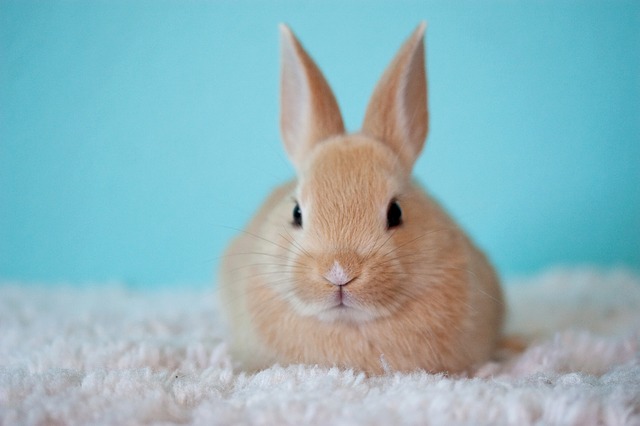This month we are focusing on our furry rabbit friends who are often misunderstood as being an easy pet to look after. Domestic rabbits can live to be 8-12 years old (the same age as many of our large dog companions). They require just as much commitment as a dog or a cat and should not be taken on without understanding how to care for them correctly
If a rabbit is the right pet for you then we hope these top five topics will help you keep them healthy and happy.
- Behaviour
Rabbits are very sociable, which is why we keep them in pairs or groups. Too often rabbits are placed in a tiny hutch at the bottom of the garden where they are forgotten. This is not only sad, but it is a form of neglect which can be reported to the police and RSPCA. Many rabbit behaviour problems occur from poor husbandry, so it is important to give them everything they need to be happy.
If you keep your rabbits outdoors make sure their hutch is large enough that they can move around and have separate areas to eat, sleep and toilet. A hutch can never be too big, but as a minimum must be 6x2x2 feet (180x60x60 cm) for a pair of rabbits. Providing them with different levels that they can jump onto, lots of bedding they can bury themselves in and toys that they can play with will help give them mental stimulation. Exercise is also very important as rabbits are athletic animals. Giving your rabbits plenty of time to run around the house or in an outdoor run each day will help keep them healthy and happy.
Rabbits that have not grown up together may need to go through a bonding process so you can house them collectively. This is not always easy so please feel free to ask advice from us before you introduce new rabbits. Rabbits get very lonely if they are on their own, so if you cannot pair your rabbit we recommend you keep them indoors so they get lots of human company instead.
Of course, if you’re keeping more than one rabbit housed together you need to make sure they are the same gender or neutered to avoid ending up with kits. Male and female rabbits can be paired together as long as they have been neutered. Neutering is strongly recommended as it can help decrease fighting and aggressive behaviour, as well as make your pet easier to handle. It also has great health benefits, particularly to female rabbits that have 60-80% chance of getting uterine cancer as they get older.
- Diet
Rabbits are designed to eat grass and in the wild they eat little else. Our pet rabbits are not very different from wild ones and so shouldn’t really be fed any differently. Getting your rabbit’s diet correct is essential to keeping them healthy, as doing it wrong causes a massive number of problems. If you ever notice your rabbit has not eaten for more than half a day call us immediately to get an appointment, as this is an emergency. To be sure you’re getting it right follow these easy guidelines:
- Make sure fresh grass or hay is available at all times. You cannot give them too much of this, it should make up around 85% of their diet.
- Supply fresh water in a bowl or a bottle and change this daily.
- Feed 1 level eggcup of nuggets twice a day for each 2.5kg rabbit (5% of their diet). If your rabbit weighs less than 2.5kg then you need to reduce the amount accordingly. Nuggets should be “complete” i.e. all the same colour, and not a muesli-type (multi-coloured) to stop them choosing only the bits they like!
- Feed small amounts of other plants/fruit/vegetables as treats (10% of their diet). Our team will happily give you options for safe treats to give your rabbit but in general dark green vegetables are good, e.g kale, spinach, rocket. Only give starchy/sugary foods like carrots and apples once a week.
- Teeth
Dental problems are one of the most common reasons why your rabbit may need to see our vets. Rabbits’ teeth grow continuously so they need to grind them down by eating lots of hay or grass to stop them overgrowing. This is one reason why getting their diet right is so important. When the teeth get too long they become pointy and start to “dig in” to your rabbit’s gums and tongue, causing pain. This stops them from eating which is then life-threatening. If you see any of the following symptoms, make an appointment to see our vets immediately:
- Decreased appetite
- Decreased or smaller faeces
- Drooling
- Lethargy
If your rabbit has problems with their teeth our vets can help treat them. We advise that every rabbit has an examination to check their teeth every 6 months (one of which can be with your vaccinations) so we can spot problems early and start treatment before your pet becomes ill.
- Vaccinations
We currently vaccinate rabbits against Myxomatosis and Rabbit Haemorrhagic Disease (RHD) both of which are deadly viruses that in most cases cannot be treated. These diseases are so lethal that prevention is the best way to protect your rabbit which is why we recommend annual vaccinations. Presently, there are two vaccinations against RHD because there are two different forms of the virus (RHD1 and RHD2) and they require different vaccines to protect against them. Our current protocol is to vaccinate your rabbit for myxomatosis and RHD1 first, and then RHD2 two or more weeks later. These vaccines cannot currently be given at the same time as it makes them less effective. Our vets will of course give your rabbit a health check when they come in for their vaccine, which is a great time for us to check their teeth for you!
- Bottoms
We know this seems like a weird topic but it’s actually very important! If your rabbit is producing less poop than normal this is usually one of the first indications that something is wrong and you should be contacting us for an appointment. Cleaning out their hutch daily helps you recognise this early, as well as making sure your rabbits stay clean and happy.
It is also important to notice when their poop is too loose and sticking to them. Normal healthy rabbits on a good diet should have nice clean bottoms. If your rabbit is getting diarrhoea then it may be a diet issue, but our vets can help check for other possible causes. We advise you pick up your rabbit twice a day to check that their bums are clean. This is particularly important during the warmer months when flies are around. Dirty bums attract flies which can then lay eggs on your rabbit. In warm weather the eggs can hatch into maggots within 24 hours, resulting in a disease called fly-strike. If you see eggs/maggots they need to be groomed out immediately before they burrow inside your pet. If you are concerned call the practice immediately for an appointment as fly-strike can be deadly if not treated right away.
We hope you found our top five topics helpful and if you have any further questions or concerns please feel free to give us a call. Rabbits are wonderful pets and we will do our best to help you keep them happy and healthy.

